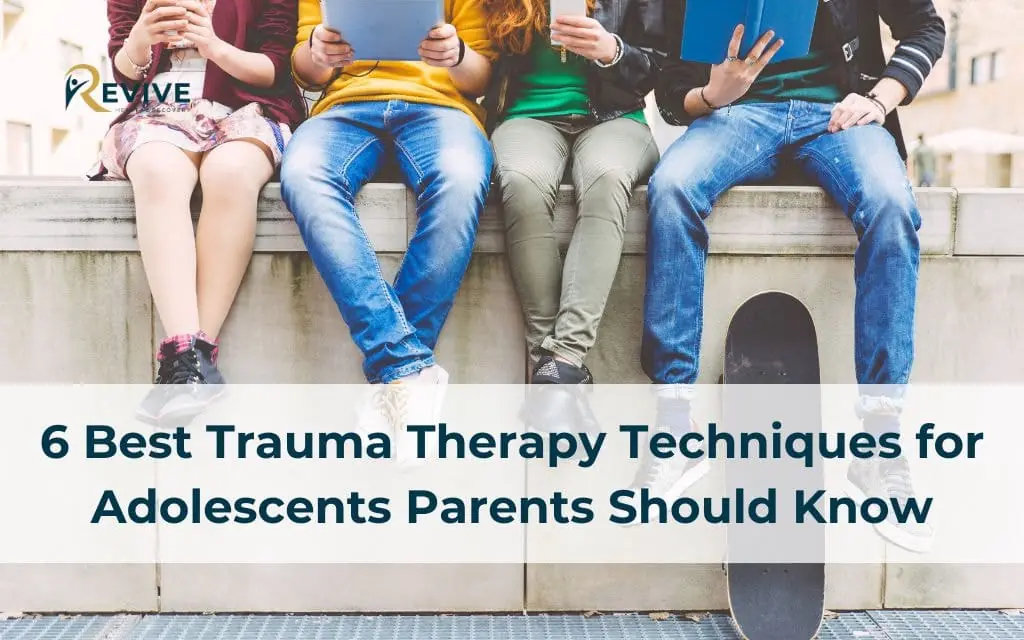In Denver, approximately one in five adolescents experiences trauma before adulthood, creating significant developmental challenges. Trauma therapy for adolescents encompasses specialized approaches designed to help teens process traumatic experiences and develop healthier mechanisms for overcoming past pain.
Colorado, particularly Denver, has seen increasing demand for youth mental health services due to urban stressors, academic pressures, and diverse community challenges. Unlike adult treatment, adolescent trauma therapy addresses unique developmental needs of young people whose brains and identities are still forming.
At Revive Health Recovery, we recognize effective healing requires evidence-based approaches tailored specifically to adolescents. This guide offers comprehensive information about trauma therapy techniques for adolescents, local Denver resources, and practical support strategies for families.
Getting to know about Trauma in Adolescents
What is Trauma?
Trauma results from experiencing or witnessing events that overwhelm a person’s ability to cope. For adolescents, these experiences might include:
- Physical, emotional, or sexual abuse
- Neglect or abandonment
- Witnessing violence at home or in the community
- Serious accidents or injuries
- Natural disasters
- Sudden loss of loved ones
- Bullying or social rejection
- Medical trauma
These experiences may contribute to what experts call Adverse Childhood Experiences (ACEs).
Symptoms and Effects
Trauma manifests differently in teenagers compared to adults or younger children. Common signs include:
- Anxiety, panic attacks, or heightened stress responses
- Withdrawal from friends and activities
- Sleep disturbances including nightmares
- Academic decline
- Substance experimentation or abuse
- Self-harming behaviors
- Intense mood swings or emotional outbursts
- Somatic complaints (headaches, stomach issues)
- Risky behaviors or poor decision-making
Research from the National Institute of Mental Health (NIMH) indicates that unresolved trauma during adolescence can disrupt normal brain development, affecting the prefrontal cortex (responsible for decision-making) and the amygdala (which regulates emotions). These disruptions can lead to long-term impacts on emotional regulation, cognition, and relationship formation.
Learn more about childhood trauma and its long-term effects.

Why Teens Require Specialized Approaches
Adolescents occupy a unique developmental space between childhood and adulthood. Their brains are undergoing significant restructuring, particularly in areas responsible for impulse control, risk assessment, and emotional regulation. Simultaneously, they face complex identity formation tasks and increasing social pressures.
According to Dr. Ann Masten, renowned resilience researcher, adolescence represents both a period of vulnerability and opportunity. The same neuroplasticity that makes teens susceptible to trauma’s negative impacts also creates exceptional potential for healing with the right interventions.
Effective Trauma Therapy Techniques for Teens
When addressing adolescent trauma, therapists draw from various evidence-based practices tailored to meet the unique needs of teenagers. Effective interventions have been researched and validated by professional organizations. The following approaches show strong effectiveness for trauma treatment in this age group:
- Trauma-Focused Cognitive Behavioral Therapy (TF-CBT)
TF-CBT stands as the gold standard for treating trauma-related symptoms in adolescents, particularly those experiencing post-traumatic stress disorder (PTSD). This structured approach typically spans 12-16 sessions and incorporates:
- Psychoeducation about trauma and its effects
- Stress management and relaxation techniques
- Cognitive processing and restructuring to address distorted thoughts
- Gradual exposure to traumatic memories in a safe environment
- Development of a coherent trauma narrative
- Family involvement to enhance support systems
Research consistently shows TF-CBT reduces PTSD symptoms, depression, and behavioral problems in adolescents. For teens in Denver seeking trauma-focused cognitive behavioral therapy for adolescents with PTSD, this approach offers clear structure and measurable outcomes.
- Eye Movement Desensitization and Reprocessing (EMDR)
EMDR therapy has gained substantial recognition for treating trauma in adolescents, particularly those struggling with specific traumatic memories. The process involves:
- Bilateral stimulation (typically eye movements, taps, or tones)
- Simultaneous focus on traumatic memories
- Processing and integration of these memories in new, less distressing ways
EMDR therapy for teen survivors of abuse in Colorado has shown excellent results, often requiring fewer sessions than traditional talk therapy approaches. This technique helps the brain process traumatic memories similarly to REM sleep, reducing their emotional charge while preserving factual knowledge.
3. Somatic Therapy
Somatic approaches focus on the body-mind connection, acknowledging that trauma remains stored in physical sensations and reactions. For adolescents who struggle to verbalize their experiences, somatic therapy provides alternative pathways to healing through:
- Body awareness techniques
- Breath work and grounding exercises
- Movement therapy
- Recognition of physical trauma responses
- Development of safety within bodily sensations
Somatic approaches prove particularly effective for teens who experienced trauma before they developed language skills or who feel disconnected from their bodies due to traumatic experiences.

4. Art and Play Therapy
Creative expression offers powerful healing opportunities for adolescents, especially younger teens who may not possess the vocabulary or emotional awareness to discuss trauma directly. These approaches include:
- Visual arts (drawing, painting, sculpture)
- Music therapy (both creation and receptive listening)
- Drama and role-play
- Sand tray therapy
- Movement and dance
Art therapy for adolescent trauma creates safe avenues for expressing and processing difficult emotions, accessing traumatic memories indirectly, and developing new narratives around traumatic experiences.
Explore more about art therapy for trauma survivors.
5. Brainspotting
This relatively newer neurobiological therapy locates and processes trauma held in subcortical brain regions. Using focused eye positions called “brainspots,” the therapist helps the adolescent access, process, and release traumatic material that may be inaccessible through traditional talk therapy.
Brainspotting works well for teens because:
- Sessions don’t require extensive verbal processing
- The approach respects the client’s innate healing capacity
- Results often appear more quickly than with some traditional therapies
- The process can bypass resistance common in adolescents
6. Innovative Options
Several cutting-edge approaches show promise for adolescent trauma treatment:
- Virtual Reality Therapy: Allows for controlled exposure to traumatic triggers in a safe environment
- Equine-Assisted Therapy: Interaction with horses builds confidence and emotional regulation skills
- Culturally-Responsive Approaches: Integrates cultural values, strengths, and healing traditions
- Peer Support Models: Guided groups where teens share experiences and gain validation
- Forest Therapy: Nature-based interventions that reduce stress and promote healing
At Revive Health Recovery, we continuously evaluate emerging techniques while maintaining commitment to evidence-based practices for adolescent trauma recovery.
Choosing the Right Trauma Therapy for Your Teenager
Selecting appropriate trauma therapy requires careful consideration of multiple factors:
Key Factors for Selection
- Type and severity of trauma: Different traumas may respond better to specific approaches, such as cognitive processing therapy for childhood trauma.
- Presenting symptoms: Whether anxiety, depression, or behavioral issues predominate
- Age and developmental stage: Therapy must match cognitive and emotional capabilities
- Learning style: Visual, auditory, or kinesthetic preferences influence therapy effectiveness
- Previous therapy experiences: Both positive and negative experiences inform current needs
- Co-occurring conditions: ADHD, anxiety, depression, or substance issues require integrated approaches
Developmental Considerations
Effective adolescent therapy acknowledges the developmental challenges teens face. Therapists must understand:
- Brain development patterns during adolescence
- Identity formation processes
- Changing family dynamics
- Peer relationship importance
- Academic stressors
- Technology’s role in teen life
When researching how to choose the right trauma therapy for my teenager, remember that appropriate approaches evolve as adolescents mature and their needs change.
Cultural Sensitivity
Denver’s diverse community requires culturally attuned trauma therapy. Effective therapists should:
- Understand cultural contexts of trauma experiences
- Recognize cultural factors in symptom expression
- Respect cultural values regarding mental health
- Adapt therapeutic approaches accordingly
- Involve cultural supports when appropriate
Questions to Ask Potential Therapists
When interviewing potential providers, consider asking:
- What specialized training do you have in adolescent trauma?
- Which evidence-based approaches do you use?
- How do you involve parents/caregivers?
- What is your experience with my child’s specific trauma type?
- How do you measure progress?
- What is your approach to medication if needed?
- How do you handle crisis situations?
Finding a Trauma Therapist in Denver
How to Search Effectively
Finding appropriate trauma care requires methodical research:
- Check credentials: Look for licensed psychologists, social workers, or counselors with specific trauma training
- Verify specialization: Ensure experience with both trauma and adolescents
- Read reviews: Consider testimonials from other families
- Consult school counselors: They often maintain lists of reputable providers
- Ask for referrals: Primary care physicians can recommend trusted specialists
To find adolescent trauma therapist in Denver, utilize online directories, professional associations, and insurance provider networks.
Local Denver Options
Revive Health Recovery stands as Denver’s premier provider of trauma therapy for adolescents. Our center offers:
- Comprehensive assessment: Each adolescent receives a thorough evaluation to determine specific needs and challenges
- Multidisciplinary team: Access to therapists, counselors, and other specialists all under one roof
- Diverse therapeutic approaches: TF-CBT, EMDR, art therapy, somatic approaches, and more
- Flexible scheduling: Evening and weekend appointments accommodate school schedules
- Family integration: Parents receive guidance and support throughout the healing journey
- Cultural competence: Services tailored to Denver’s diverse communities
- Trauma-informed environment: Our facility is designed to promote safety and comfort
Located at 1427 S Federal Blvd in Denver, Revive Health Recovery combines evidence-based trauma techniques with holistic support to address the unique needs of adolescents throughout their recovery journey.
Cost Considerations
The cost of trauma therapy for adolescents in Denver varies considerably:
- Private practice: Ranges from moderate to higher-end fees
- Sliding scale options: Adjusted rates based on income
- Insurance coverage: Standard mental health copays apply
- Community clinics: More affordable options available
- Group therapy: Generally lower cost than individual sessions
Many providers offer options for families facing financial constraints. Check whether your insurance plan covers mental health services, and inquire about sliding scale fees, payment plans, or scholarship opportunities.

Online Therapy Options
For families with transportation challenges or busy schedules, online trauma therapy for adolescents in Denver provides an accessible alternative. Benefits include:
- Flexible scheduling
- Elimination of travel time
- Comfort of familiar environment
- Reduced stigma concerns
- Continuity during illness or inclement weather
Research indicates that teletherapy can be as effective as in-person treatment for many adolescents, particularly those comfortable with technology.
Supporting Your Teenager Through Trauma Therapy
Parents and caregivers play crucial roles in the healing process. Here’s how to support your adolescent effectively:
Parental Role in Recovery
- Create a predictable, safe home environment
- Validate emotions without judgment
- Maintain appropriate boundaries
- Model healthy stress management
- Balance support with gradual autonomy
- Monitor but avoid interrogating about therapy content
Understanding strategies for supporting your teenager’s mental health is key to facilitating their recovery from trauma.
Communication Tips
Discussing trauma and therapy requires sensitivity:
- Use open-ended questions
- Avoid forced conversations
- Acknowledge discomfort
- Respect privacy boundaries
- Create informal talking opportunities (e.g., during car rides)
- Listen more than you speak
A parent’s guide to adolescent trauma therapy emphasizes patience—healing often involves progression and regression cycles.
Home Environment Considerations
Recovery-supporting homes typically feature:
- Consistent routines
- Clear expectations
- Emotional safety
- Physical safety
- Reduced chaos and unpredictability
- Space for privacy and reflection
- Open but respectful communication
Family Therapy Benefits
Family therapy in conjunction with individual therapy enhances outcomes by:
- Improving family communication patterns
- Addressing unhelpful family dynamics
- Teaching families how to respond to triggers
- Providing education about trauma effects
- Building collective resilience
- Healing relationship ruptures
School Collaboration
Coordinating with school supports creates consistency:
- Share relevant information with appropriate staff
- Develop safety plans for triggered moments
- Arrange academic accommodations if needed
- Ensure communication between therapist and school counselor
- Request trauma-informed approaches from teachers
Knowing how to support a teenager through trauma therapy means becoming an informed advocate across all environments.
Additional Resources for Teen Mental Health in Denver
School-Based Services
Denver area schools increasingly offer mental health supports:
- School counselors trained in trauma
- School-based mental health services through community partnerships
- Crisis intervention teams
- Bullying prevention programs
- Social-emotional learning curricula
Peer Support Options
Peer support groups for adolescents provide validation from others with similar experiences:
- Structured groups led by mental health professionals
- Informal peer mentorship programs
- Activity-based support programs (art, sports, outdoor activities)
- Online moderated communities
- Youth advisory boards for mental health organizations

Organizations and Agencies
Several organizations provide resources, education, and direct services:
- American Academy of Child and Adolescent Psychiatry (AACAP): Professional guidelines and parent resources
- National Institute of Mental Health (NIMH): Research updates and educational materials
- Colorado Crisis Services: 24/7 support line and walk-in centers
- Denver Children’s Advocacy Center: Specialized trauma services
- The Blue Bench: Support for sexual trauma survivors
- Tennyson Center for Children: Comprehensive trauma care
FAQs About Trauma Therapy for Adolescents
What are the most effective trauma therapy techniques for adolescents?
TF-CBT and EMDR lead as evidence-based approaches for adolescent trauma. Creative therapies like art therapy also show strong results, especially for younger teens. At Revive Health Recovery, we assess each adolescent individually to determine which approach will be most effective for their specific situation.
How can I find a reputable trauma therapist in Denver for my teenager?
Begin by checking credentials, specialization in adolescent trauma, and experience. Consult your insurance provider network, get referrals from school counselors or your pediatrician, or contact Revive Health Recovery directly for an evaluation. Our team specializes in trauma-informed care for adolescents throughout the Denver metro area.
What is the typical duration of trauma therapy for adolescents?
Treatment length varies based on trauma severity, symptoms, and therapy type. TF-CBT typically requires 12-16 sessions, while EMDR might require 8-12 sessions. Complex trauma often requires longer treatment. Revive Health Recovery focuses on efficient, effective care tailored to each teen’s needs and recovery pace.
How much does trauma therapy for adolescents cost in Denver?
The cost of trauma therapy for adolescents in Denver ranges from $100-200 per session for private practice providers. Most insurance plans cover mental health services with standard copays. Revive Health Recovery works with multiple insurance providers and offers various payment options to ensure accessibility.
How can parents support their teenager during trauma therapy?
Parents should maintain open communication, validate feelings without judgment, ensure consistency at home, and participate in family sessions when recommended. Create a safe environment where emotions can be expressed appropriately. Revive Health Recovery provides parent guidance throughout the treatment process to enhance outcomes.
Conclusion
Adolescent trauma requires specialized, evidence-based treatment approaches that address both the traumatic experience and the unique developmental needs of teenagers. Through methods like TF-CBT, EMDR, creative therapies, and innovative approaches, healing is possible even from severe trauma.
For families in Denver navigating this challenging journey, numerous resources exist to support both teens and their support systems. Remember that recovery isn’t linear—progress may include setbacks, but with consistent, appropriate care, adolescents demonstrate remarkable resilience.
If your teenager is struggling with trauma effects, don’t wait to seek professional help. Early intervention significantly improves outcomes and prevents long-term complications. Contact Revive Health Recovery today to schedule an assessment and develop a personalized treatment plan for your adolescent.
Through informed choice of therapy techniques, consistent support, and professional guidance, teenagers can not only recover from trauma but emerge with greater strength, self-awareness, and life coping skills that will serve them throughout their lives.



